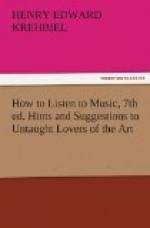[Sidenote: The phrases should be studied.]
“It cannot be too forcibly urged that if we confine our study of Wagner to the forms and names of the phrases out of which he constructs his musical fabric, we shall, at the last, have enriched our minds with a thematic catalogue and—nothing else. We shall remain guiltless of knowledge unless we learn something of the nature of those phrases by noting the attributes which lend them propriety and fitness, and can recognize, measurably at least, the reasons for their introduction and development. Those attributes give character and mood to the music constructed out of the phrases. If we are able to feel the mood, we need not care how the phrases which produce it have been labelled. If we do not feel the mood, we may memorize the whole thematic catalogue of Wolzogen and have our labor for our pains. It would be better to know nothing about the phrases, and content one’s self with simple sensuous enjoyment than to spend one’s time answering the baldest of all the riddles of Wagner’s orchestra—’What am I playing now?’
[Sidenote: The question of effectiveness.]
“The ultimate question concerning the correctness or effectiveness of Wagner’s system of composition must, of course, be answered along with the question: ’Does the composition, as a whole, touch the emotions, quicken the fancy, fire the imagination?’ If it does these things, we may, to a great extent, if we wish, get along without the intellectual processes of reflection and comparison which are conditioned upon a recognition of the themes and their uses. But if we put aside this intellectual activity, we shall deprive ourselves, among other things, of the pleasures which it is the province of memory to give; and the exercise of memory is called for by music much more urgently than by any other art, because of its volatile nature and the role which repetition plays in it.”
FOOTNOTES:
[E] “But no real student can have studied the score deeply, or listened discriminatingly to a good performance, without discovering that there is a tremendous chasm between the conventional aims of the Italian poet in the book of the opera and the work which emerged from the composer’s profound imagination. Da Ponte contemplated a dramma giocoso; Mozart humored him until his imagination came within the shadow cast before by the catastrophe, and then he transformed the poet’s comedy into a tragedy of crushing power. The climax of Da Ponte’s ideal is reached in a picture of the dissolute Don wrestling in idle desperation with a host of spectacular devils, and finally disappearing through a trap, while fire bursts out on all sides, the thunders roll, and Leporello gazes on the scene, crouched in a comic attitude of terror, under the table. Such a picture satisfied the tastes of the public of his




